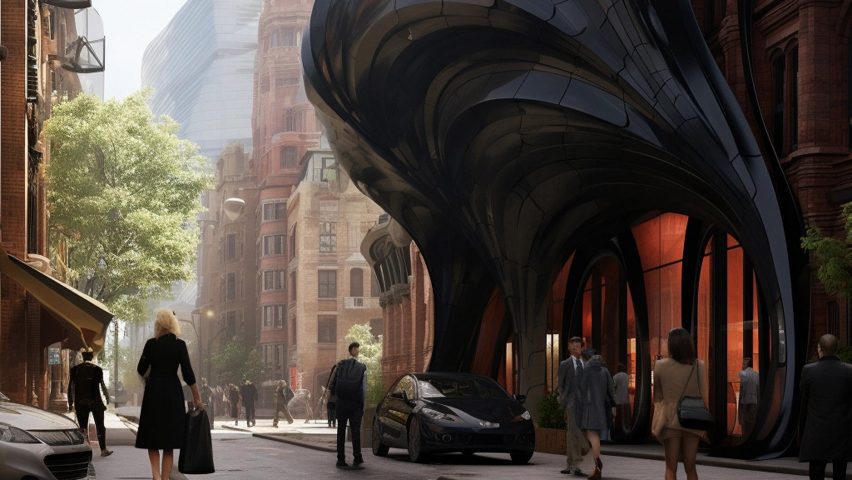Close to half of UK architects are now utilising artificial intelligence to carry out their projects, a report by the Royal Institute of British Architects has revealed.
The survey, which is the Royal Institute of British Architects' (RIBA) first examination of the industry's use of artificial intelligence (AI), revealed that 41 per cent of UK architects are already employing the technology "on at least the occasional project".
Additionally, 43 per cent of those architects using AI believe it has improved the efficiency of their design process.
Among the ways these architects are currently using the technology is for the automation of admin-based tasks and to reduce the carbon footprint of projects in tandem with digital twins.
"We use AI to provide code for the automation of various aspects of project and document management, but still to a very limited degree," said one of the anonymous respondents.
"We use virtual environments and digital twins to achieve a radical reduction in the carbon, energy, water, and waste footprints of costly physical construction," added another.
"There's no turning back"
RIBA president Muyiwa Oki said the findings show "there's no turning back" from AI.
"AI is the most disruptive tool of our time, and we cannot overstate its role in shaping the future of architecture – from the character of our cities to the quality of our built environment," he said.
"Our findings show architects are curious and open-minded about AI, and some of us are true pioneers," Oki continued.
"By fostering interdisciplinary collaboration and a culture of responsible innovation, we can harness the power of AI to create a more inclusive, resilient and sustainable built environment. There's no turning back."
AI attracted significant hype in 2023 and was the focus of one of Dezeen's major editorial series AItopia. As part of the series, we spoke to several experts to uncover the potential impact of AI on architecture.
Among them were AI-specialist architect Arturo Tedeschi, who told Dezeen that designing using artificial intelligence is a form of creativity tantamount to an evolution of our species.
However, Online Lab of Architecture co-founder Daniel Escobar warned that over-reliance on AI tools could result in boring buildings.
RIBA establishes "expert advisory group" on AI
In response to AI's growing popularity, RIBA has established an "expert advisory group" to investigate the potential implications of its use within the architecture industry.
"RIBA's new Expert Advisory Group on AI is building on the findings of this report to look at the broader ethical, professional, and competitive implications of the widespread integration of AI," said Oki.
Other findings in the report, published on 29 February, included 54 per cent of architects expecting their studios to use AI in the future and 57 per cent believing it will improve the efficiency of their work.
When asked specifically how they expect AI to be used, 57 per cent of respondents said that within the next two years, they believe AI will be capable of helping them analyse a design's environmental impact.
In the same vein, 49 per cent said AI is among the digital tools that will be "necessary to meet the increasingly complexity of buildings", including climate adaptations.
However, despite these statistics, 69 per cent of respondents said their studio is yet to invest in AI, and only 41 per cent expect to do so in the future.
Potential impact of AI on profession remains divisive
More negative findings included 58 per cent of architects believing AI increases the risk of their work being imitated. This reflects the views of several experts we spoke to as part of AItopia, who warned that the increase in the use of AI could have major copyright implications for designers and architects.
Whether or not AI is a threat to the profession was inconclusive in the report, with 36 per cent seeing it as a threat, 34 per cent not concerned and 30 per cent still unsure.
This has been a hot topic in AI and architecture in recent years after designer Sebastian Errazuriz claimed that 90 per cent of architects could lose their jobs to machines.
More recently, investment bank Goldman Sachs predicted AI could replace the equivalent of 300 million jobs globally. The researchers also estimated that 37 per cent of architecture and engineering tasks "could be automated by AI".
We also put the question to several experts as part of AItopia, with interviewees including d ArchiTAG co-founder George Guida, who was more optimistic.
"Our current traditional methodology will radically change, but not be substituted," said Guida. "I do think that architects still will need to stay at the centre of being the driver within that process."
The image is named Experiment with Midjourney, courtesy of Jaina Valji, Copy and Space via RIBA.

